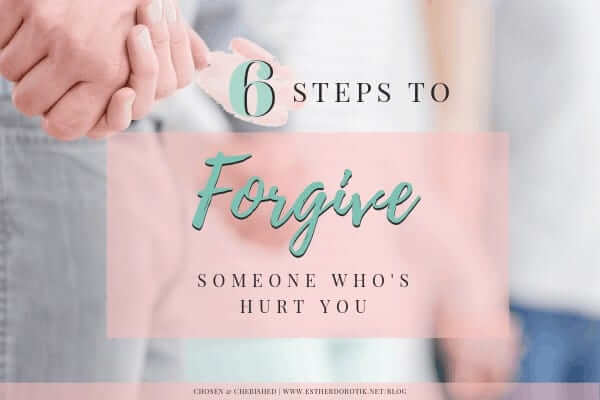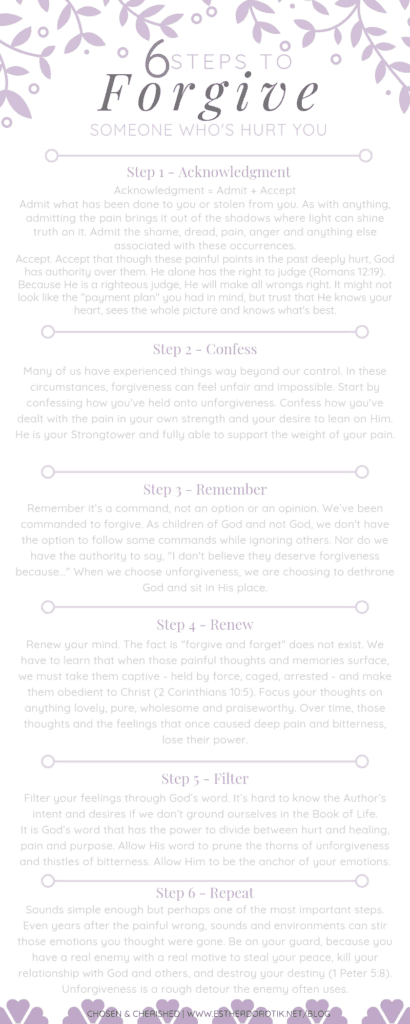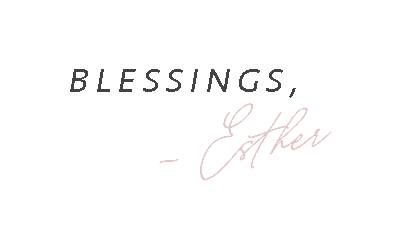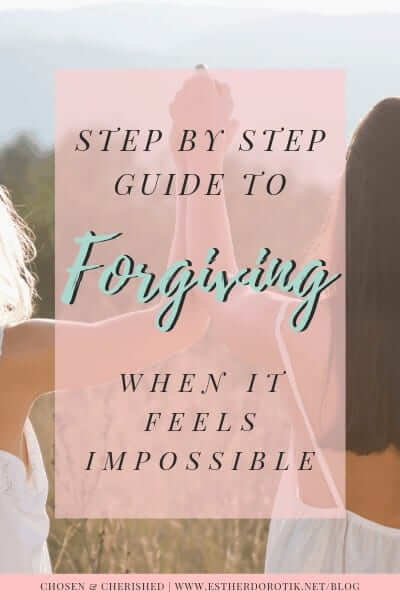If you’ve lived for any amount of time, you know the pain of wrongdoings and the resistance of forgiveness. Let’s face it, forgiving is hard. It requires humility. Surrender. The laying down our stones. We want payment for our pain. In essence, we want the person to experience the pain they’ve inflicted.
With bricks of anger, bitterness, distance, and resentment, we build walls of protection around our hearts. The problem is, when we keep others out, we’re also keeping God out.
Years ago, I had a Texas-sized splinter that proved more resilient with each attempt to get it out. Months later, if I stepped wrong, the sudden reminder of its presence would rear its ugly head. It remained under the surface just enough to hurt.
Much like that pesky splinter, painful points in life tend to sit just under the surface waiting to be triggered. While the initial pain comes from the incision, over time, “infection” grows and festers due to the bacteria of unforgiveness. Yes, unforgiveness is a bacteria. It grows in dark places, multiplies quickly, and infects tender heart tissue.
The reality is, like our physical bodies, which were designed to reject foreign things, our spirits were designed to reject the foreign idea of unforgiveness.
Unforgiveness, like a festering splinter, rears its ugly head causing pain when touched.

So what is forgiveness?
The original term meant fully released. In essence, forgiveness is surrendering the claim to make them “pay.” You’re freeing yourself from the bitterness, resentment, hatred, grudges, and jealousy that forms as a result of unforgiveness — choosing to forgive releases you from the negative focus that shadows unforgiveness.
What forgiveness is not.
Forgiveness is not releasing what they’ve done as being okay. Forgiveness also does not require repeated exposure to the pain. Years ago, my daughter had a friend she adored. This friend was fun and silly with a wild imagination. The problem was this friend had a way of hurting my daughter with her words and actions. We had many conversations of forgiving to move forward as friends. But one day, I watched my daughter’s face as the sheer excitement of sharing good news with her friend turn to painful disappointment. I pulled her aside and explained that forgiving doesn’t mean returning to the treatment of someone who refuses to change. Times may come when we must forgive yet move on.
Can you go on without forgiving?
You most certainly can. BUT there is a silent, swift and stifling cost of unforgiveness.
The fact is, unforgiveness leads to a root of bitterness. In the story of Cain and Abel found in Genesis 4, bitterness and anger compelled Cain to kill his brother but not before a powerful forewarning. In verse 7, God warns Cain, “sin is crouching at your door; it desires to have you, but you must master it.”
Hebrews 12:15 says, “See to it that no one misses the grace of God and that no bitter root grows up to cause trouble and defile many. When we miss the grace of God and refuse to extend it to others, we are cracking the door on the sinful ways desiring to annihilate us. We are planting a bitter seed. And like the weeds in a yard, if they’re not pulled, they will quickly overtake and kill the good grass.
We must master it. Unforgiveness not only causes trouble for you but also defiles loved ones who bear the brunt of calloused comments and angry attitudes.
Why should we forgive someone who’s hurt us so badly?
Three reasons.
First, because God is merciful and forgiving, even when rebel against Him (Daniel 9:9). In God’s abounding love, He has chosen not to treat us as our sins deserve but instead cast them as far as the east is from the west; two points that never meet (Psalm 103;8-12). He is quick to extend grace. Are we?
Second, because forgiveness is a command. What if we were forgiven to the extent we forgave? In Matthew 6:9-15, as Christ taught his disciples how to pray, we come across this verse, “Forgive us our debts, as we also have forgiven our debtors.” He then goes on to say, if you forgive, you will be forgiven; if you do not forgive, you will not receive forgiveness. It’s a harsh reality, but one that requires utmost attention. How can we ask God for something we refuse to extend?
Third, because forgiveness isn’t just a command but also a gift. A treasure to be opened and shared. One that releases you from bitterness and heartache down the road. You see, forgiveness is God’s gift to us, but our forgiveness of others is our gift back to Him.

How often must we forgive?
Much like Peter in Matthew 18:21-22, we’re probably not prepared for the answer to this question: over and over and over and over. Because we consistently receive His forgiveness, we must continuously release His forgiveness. I don’t know about you, but not a day goes by that I don’t need God’s lavish gift of forgiveness. We can’t withhold it from others if we want to receive it ourselves.
How do I know if I’m harboring unforgiveness?
While I’ve included some questions below, the best answer to this is prayer. God knows the heart better than any human question can reveal. Spend time asking God to unmask any unconfessed sin of bitterness, resentment, and unforgiveness.
Does anger or resentment surface when someone’s name comes to mind?
Do you have a hard time not thinking negative thoughts about an individual?
Do specific memories trigger deep pain or bitterness?
Do you cringe at the sound of someone’s name?
Do you wish an individual pain or suffering?
Do you relieve the moment?
Do you feel jealousy arise when you think about where that person is in comparison to you now?
How can we extend forgiveness?
Forgiveness is only found through Christ and understanding how much He has forgiven you. Because he who has been forgiven much loves much, we can more easily love others and thereby forgive them when we realize how much we have been forgiven. Apart from Him, we can do nothing, including forgive (John 15:5).
I’ve seen firsthand what living in a painful past can do. The bitter words that ooze from someone’s mouth. The glares that could effortlessly pierce a metal shield. The volcano of anger arising from their core and the resentful attitude toward others. Yes, I’ve watched loved ones walk down the path of grievous brooding, unaware of the festering foreign object of unforgiveness.
Whether the offense is big or small, if you’re struggling to forgive someone, you’re not alone. Here are six steps to help us lay down our stones and walk down a path of flourishing forgiveness.
Step One – Acknowledgement
Let’s face it, hidden things tend to fester. The longer it remains buried, the more powerfully vast the root system becomes. The first step to extending forgiveness is through acknowledgment. Simply put, acknowledgment is admitting and accepting
Acknowledgment = admitting + accepting
Admit what has been done to you or stolen from you. As with anything, admitting the pain brings it out of the shadows where light can shine truth on it. Admit the shame, dread, grief, anger, and anything else associated with these occurrences.
Accept. Accept that though these painful points in the past deeply hurt God has authority over them. He alone has the right to judge (Romans 12:19). And, because God is a righteous judge, He will make all wrongs right. It might not look like the “payment plan” you had in mind, but trust that He knows your heart, sees the whole picture, and knows what’s best.

Step Two – Confess
Many of us have experienced things way beyond our control. Perhaps it was a parent’s abandonment or abuse, the betrayal of a spouse, or the evil act of a stranger. In these circumstances, forgiveness can feel unfair and impossible. Start by confessing how you’ve held onto unforgiveness. Or, perhaps it’s God who you’ve blamed. Maybe the treatment you’ve received has left you disappointed in God. Whatever the case may be, confess how you’ve dealt with the pain in your strength and your desire to lean on Him instead. He is your Strongtower and fully able to support the weight of your pain.
While there are many times we had no choice in the act, there are certain instances when our actions might have contributed to someone else’s selfish act. Confess your part, if any. If we confess our sins, he is faithful and to forgive us our sins, and to cleanse us from all unrighteousness (1 John 1:9). Confession cleanses our soul and allows us to move forward in forgiveness.
Step Three – Remember
Remember it’s a command, not an option or an opinion. We’ve been commanded to forgive. As children of God and not God, we don’t have the option to follow some commands while ignoring others. Nor do we have the authority to say, “I don’t believe they deserve forgiveness because…” When we choose unforgiveness, we are choosing to dethrone God and sit in His place.
I get it, the deeper the hurt, the harder it is to forgive. But with God, it is possible. Unforgiveness is a shackle that keeps you locked to the person who hurt you. Forgiveness is the key to freeing yourself. Isn’t it time to walk away from that prison cell?
Step Four – Renew
Renew your mind. The fact is, “forgive and forget” does not exist. We have to learn that when those painful thoughts and memories surface, we must take them captive – held by force, caged, arrested – and make them obedient to Christ (2 Corinthians 10:5). Focus thoughts on anything lovely, pure, wholesome, and praiseworthy. Over time, those thoughts and the feelings that once caused deep pain and bitterness, lose their power.
Step Five – Filter
Filter your feelings through God’s word. It’s hard to know the Author’s intent and desires if we don’t ground ourselves in the Book of Life.
It is God’s word that has the power to divide between hurt and healing, pain, and purpose. Allow His word to prune the thorns of unforgiveness and thistles of bitterness. He alone can judges between the thoughts and attitudes of the heart (Hebrews 4:12-13). Allow Him to be the anchor of your emotions.
Step Six – Repeat
Repeat. Sounds simple enough but perhaps one of the most critical steps. Even years after the grievous wound, sounds and environments can stir those emotions you thought were gone. If you’ve practiced step four and five, repeating the process should come a little easier. But be on your guard, because you have a real enemy with a real motive to steal your peace, kill your relationship with God and others, and destroy your destiny (1 Peter 5:8). Unforgiveness is a rough detour he often uses.
I, too, have fought the painful surrender of forgiveness. But forgiveness truly is a gift. It is the master key that unlocked our relationship with God when we first believed, and it continues to unlock our freedom. So today, if you hear His voice leading you to forgive someone, do not harden your heart (Hebrews 4:7). Instead, open your heart to the One who holds every beat it in His hand. Release the unforgiveness and receive undeniable relief and joy.
What’s holding you back? Leave me a comment!
Additional Bible Verses On Forgiveness:
Genesis 50:15-21
Ephesians 4:32
Colossians 3:13





My God! Thank you for this article. Several years ago, I carried my family, a wife and 12 year old son to a newly seeded campus off the main campus of my church.
I was involved in the prayer team, and definitely in a two way relationship of trust with the pastor. I taught middle school Sunday school and truly knew God’s presence was with us.
After a major relationship breakup, I was accused of many offences and found the church had turned against me, in word and action.
I’ve been getting over it except for the occasional memory that I would relive. I felt the resentment and the need to pay everyone back, including the entire church.
No one reached out to to ask how I was doing. I’m being truthful here. I found I was harboring resentment and didnt know how to get out.
I’ve been saved for decades and I trust God’s word, and even teach about forgiveness.
God is so great! I’ve been lead to this article and through my tears ( happy tears) I forgive the experience. I forgive everyone involved including me!
Thank you for being used by our Lord God to remind… all of us..
I tried to print the 6 steps to forgiveness image, but it comes out very faint and hard to read. Is it possible for you to make it clearer? Thank you. 🙂
Thank you so much for this guide. I really needed this today!
Unforgiveness is the key to set you free! Sometimes the enemy would have us to believe that building up a wall against the other person, getting revenge or resenting them because of what they did to us will lead to healing. It may be masked for awhile but the enemy would use that against you at the right moment that he see fit. And guess what? You are still not free! And God wants to set you free but you aren’t obeying his word which is to forgive those that has trespassed against us. God knows that forgiving is the best thing that could ever happen to us. We may not see it now but trust the process, we will definitely see it later and how it actually worked out for our good!